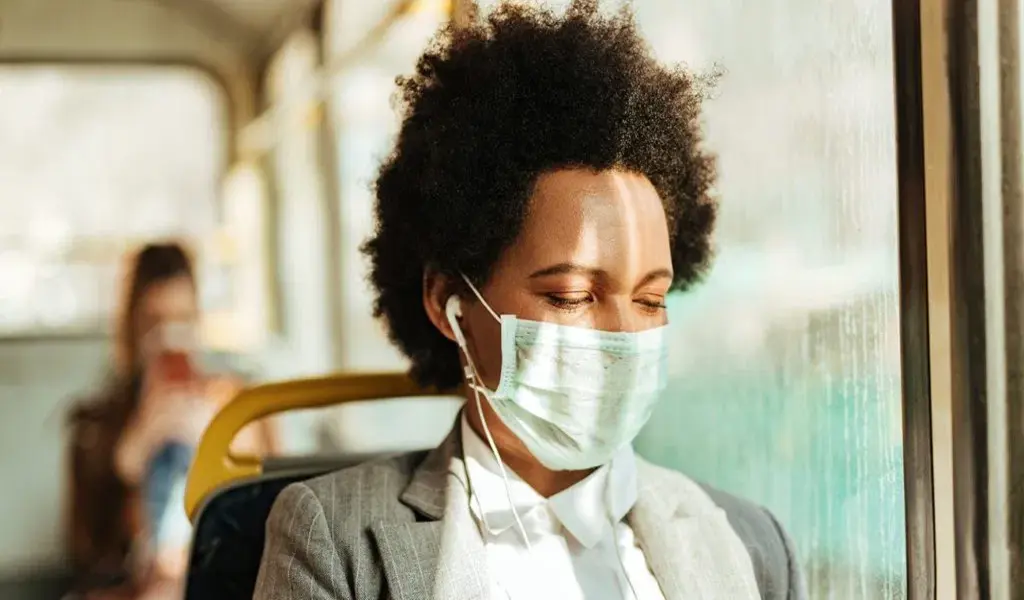Covid-19
How effective is a face mask Against COVID-19 transmission?

As everybody knows that the important components to preventing the transmission of the coronavirus are social distance, adequate hand cleanliness, and using face masks when social distance is not possible. Despite this, some people continue to refuse to use masks to assist limit the spread of COVID-19. Wearing any type of mask inside is related to much higher coronavirus protection, with high-quality N95 and KN95 masks offering the highest chance of preventing infection.
So, today we are going to know the effectivity of the face mask against Covid-19 Transmission.
Face Masks Significantly Lower Transmission Rates.
The CDC initially suggested wearing non-medical face masks in public to reduce COVID-19 transmission in the United States on April 3, 2020, as a complement to cleanliness and proper social distance. Throughout the pandemic, numerous states, counties, and municipalities have issued health orders requiring the use of non-medical face coverings, like cloth masks, in public venues and enterprises, particularly where physical separation is not practicable. Some regions initially required only public-facing workers of businesses to use them before expanding access to the general public.
To begin, it was discovered that without a mask, social separation, or any other preventative measures, the chance of coronavirus transmission is 17.4 percent. When a mask or respirator is used, that figure falls to 3.1 percent.
The capacity of masks to reduce both exhalation and inhalation of infectious viruses is what gives them their overall community value. The higher the extent to which the intervention mask-wearing in this case is accepted by the society. The greater the benefit to each member, similar to the idea of herd immunity for vaccination. The sort of mask worn may be less important than the frequency with which it is worn in the community.
The n95 mask is significantly known to lower the rates of spreading Covid-19 transmission.
Mask Safety Against Covid-19
Mask-wearing has been a source of contention since the early days of the coronavirus epidemic, when health officials advised the people not to purchase masks, claiming that they should be reserved for medical professionals. The administration quickly revised its position on masking against airborne infection and recommended everyone to use face masks.
Arguments about whether masks should be required, who has the power to impose them, and under what conditions have lasted to this day.
Despite this, the benefits of wearing a mask have been discovered to be significant. They backed up the lab and other real-world evidence that masks are an effective coronavirus barrier.
The Fundamentals Of Wearing A Mask
Some of the basic things you need to follow while wearing a mask are:
- Before putting on your mask, as well as before and after removing it, and every time you come into touch with it, wash your hands.
- Make sure your nose, mouth, and chin are all covered.
- When you remove a mask, place it in a clean plastic bag and wash it every day if it’s a fabric mask. You can also throw it away if it’s a medical mask.
The usefulness of masks, on the other hand, is still debatable. Surgical and similar masks have larger and more variable particle penetration rates (30 to 70 percent) than N95 or FFP2 respirators, which have very low particle penetration rates (5%).
Given the huge number of particles released during breathing, particularly during sneezing or coughing, the quantity of respiratory particles that may permeate masks is significant, which is one of the primary grounds for skepticism regarding their usefulness in preventing diseases.
Masking Out Air Sharing
Since the start of the COVID-19 pandemic, the efficiency of masks in limiting the spread of severe acute respiratory syndrome coronavirus 2 has been a point of contention. The effectiveness of masks notwithstanding the vigorous discharge of respiratory debris during coughing and sneezing is a significant subject. It is effectively demonstrate that the majority of individuals live in low-viral-load environments.
With the amount of respiratory matter to which a person is exposed, the likelihood of infection changes nonlinearly. If the majority of individuals in the community wear basic surgical masks, the chances of coming into contact with a virus particle are considerably lower.
The Bottom Line
To sum up everything, wearing a mask may minimize the incidence of COVID-19 infection. In the future, robust randomized studies will be required to give further evidence for these therapies. So, do not neglect this and consider wearing a mask to prevent this deadly pandemic disease.
Related CTN News:
Surrogacy In The United States
Thai Public Health Recommend A COVID Booster Every 4 Months
Thailand Warms To Drop Temperature Checks






























